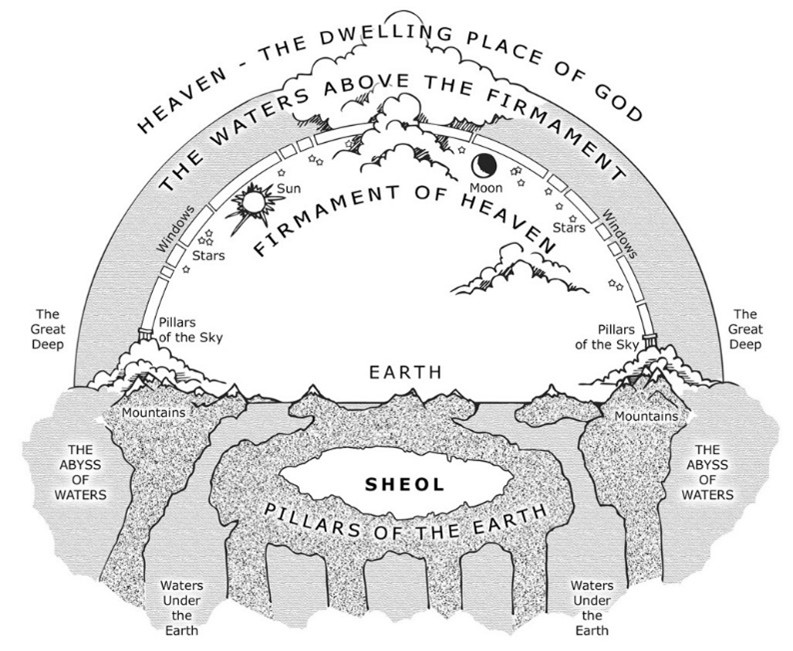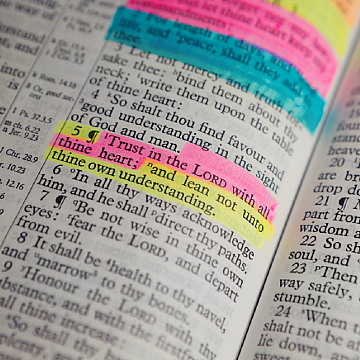For Members & Friends
My MPCEPC
Introduction
In this last post of our Good Questions series, we’re going to cover a topic that we slightly touched on in our last post (Is God Real?), and in the first two posts about the Bible, though in an indirect way. We left this topic for last in the series because it ties into the first few topics, and because it’s not an easy question to answer, if it’s a question at all. This topic can be seen as more of an ongoing debate. Simply put, this post is going to tackle the topic of science and religion. A few years ago, we were fortunate enough to have one of our church members and church elder, Dr. Steven Little (chemical engineer, professor, and researcher at the University of Pittsburgh) deliver a talk on Biblical Creation in the Eyes of a Scientist. Most of this post will walk through his talking points as an expert in the scientific field and a Christian, and tying in the last few posts of our series to his ideas. You’ll find that I will be quoting him quite often because of his expertise and I hope you’ll take the opportunity to watch his full talk once you’ve read through the post.
Science and Religion: do they mix?
Our short answer: yes! Although people tend to have a lot at stake when it comes to this conversation, we believe that science and religion are not mutually exclusive. You may have experienced conversations on this topic in the past where each “side” refuses to budge on their viewpoint. The conversation may have devolved into an argument, both “sides” leaving with a sense that the other is just too stubborn and misinformed to understand. Unfortunately, this scenario is all too common, and not just in this subject either. When the stakes are high, no one wants to lose. You’re likely to take less risks when you have something to lose. Your viewpoints are less likely to change when they are as important to you as religion is to some and science is to others. But whatever your current viewpoint is, let’s remember that we can have a conversation without argument. Let’s leave one another with a sense of understanding and respect, even if we disagree.
Now let’s dive into the long answer. In Dr. Little’s talk, he gives us some statistics from a 2014 study by Rice University: 27% of Americans believe that science and religion are in irrevocable conflict. 48% of Evangelical Christians believe science and religion are in conflict. This is a rather large percentage of us that believe science and religion cannot coexist. We’ve heard the argument so often it has become somewhat rote. I’ve heard it hundreds of times over the course of my life, but I never exactly thought to dig into why. Why do people believe these topics cannot coexist?
What I found in my research is that people believe science and religion are fundamentally incompatible because they disagree profoundly on how we obtain knowledge: science believes that evidence is gained objectively through data and does not utilize personal testimony as a method of proof. Religion, as we explored in our last post, incorporates, and encourages, the use of anecdotal evidence or personal testimony. And, in our post about the Bible’s authenticity, we discussed how all 66 books tell the same story, with an unquestionable continuity between Old Testament and New Testament, even when each book has a different author. Historically, we understand each book’s accuracy; but even further, we can look at the details about Jesus’ life from each eye-witness account to see the consistency. Each author, spanning hundreds of years, tells the same exact story of God.
“Scientists have trouble with this type of evidence,” explains Dr. Little, “because it has not been objectively collected in terms of data. And most Christians believe that their understanding of God fits in their pocket. If they can’t understand what it is or how it works, they don’t want to hear it. They are not open to listening to other things like different interpretations [like scientific ones].”
“It all comes down to the same thing: both scientists and Christians think that they are the ones that have been giving the understanding.”
But what if we have all been given the ability to understand, just in different ways?
In our first post on What is the Bible?, we talked about how Bible provides a history of creation and Christianity. Although the Bible does include information on much of history, it was never meant to inform us about everything. The book of Genesis was not written to explain how creation came to be, but more so to explain who created it. In Genesis, we read how the earth was created, and learn about Adam and Eve; however, as we continue reading, we begin to see other people populating the timeline, yet there is no mention of these others having been created. Think about this in terms of a basic story: you have your main characters and supporting characters. The main characters are well-established with backstories and continue to appear throughout the storyline. Supporting characters, though, may be present, but aren’t as well-developed in the story. Yes, they are still there, but maybe aren’t as important to the main storyline. So, if the Bible doesn’t explain everyone and everything’s existence, then might not there be other (scientific) ideas that also aren’t explored?
Or perhaps the science we see in the Bible just isn’t current. As Dr. Little points out in his talk on Biblical Creation, he notes that although the first chapter of Genesis is not meant to be scientific, if we look at it from a scientific perspective, the current view of science is not found in Genesis, but the story does represent the Mesopotamian views of science at the time. He explains how the Mesopotamians thought that the earth was protected from above by a glass roof of sorts, held up by pillars at the ends of the world. This roof protected us from the “waters” they believed were in the sky (hence we read about the waters above and waters below in the book of Genesis).
Yes, the views may not have been correct, but even science now isn’t 100%. Some things in the universe we still don’t understand. We are still seeking answers, which I think we can all agree on. In all of our posts thus far, we’ve talked a bit about God’s desire for us to know Him through asking questions and seeking answers. And if we look at the definition of science—the intellectual and practical activity encompassing the systematic study of the structure and behavior of the physical and natural world through observation and experiment—isn’t that, too, seeking answers? Isn’t studying the world around us another way of knowing God and His creation? And don’t we, as Christians, often seek to find Him in the little, everyday things in our lives? Don’t we also study the world around us for evidence of Him and His will?
Now, we can’t have a discussion about science and religion without touching on evolution. Dr. Little debunks some common misconceptions in his talk, which should be duly noted here. His response, as a scientist, is much more eloquent and informed than my own would be since I am not a scientist myself. He notes a response from a popular radio show host who said, “natural selection (only the strong survive) is cruel and random and is clearly not how God does things.” Yet Dr. Little addresses that in several ways: “The first misconception is natural selection is cruel. Natural selection means alive and sexy. It’s not cruel. It’s about attractiveness to the individual. That evolution is random is another misconception. Evolution is not random, but a result of pressures and stressors in the environment that result in changes. This isn’t random and rolling the dice. It’s difficult to wrap your head around because we are living in the middle of it. This happens in science all the time. The real misconception is that any of us would pretend to know how God does things.”
He then goes on to address the scale of things. “What if we were to imagine that in making things and creating things, the scale is bigger than we can even imagine? What if God made a system that made another system that created things that God wanted to create? What if God created the system that would create molecules that would create the humans that would interact with one another and influence each other? What if he put that much thought and care into every single detail that would turn out to be you over the billions of years of the universe? That is a sign of a personal God.”
Ultimately, the evidence we have explored here and the explanations we’ve broken down are only offering a different viewpoint. We can’t use them as definitive evidence one way or another. Yet aren’t these ideas worth considering? Might the world be big enough for science and religion to coexist—and even support each other? How do you feel these ideas are interconnected? Or not?
Now let’s dive into the long answer. In Dr. Little’s talk, he gives us some statistics from a 2014 study by Rice University: 27% of Americans believe that science and religion are in irrevocable conflict. 48% of Evangelical Christians believe science and religion are in conflict. This is a rather large percentage of us that believe science and religion cannot coexist. We’ve heard the argument so often it has become somewhat rote. I’ve heard it hundreds of times over the course of my life, but I never exactly thought to dig into why. Why do people believe these topics cannot coexist?
What I found in my research is that people believe science and religion are fundamentally incompatible because they disagree profoundly on how we obtain knowledge: science believes that evidence is gained objectively through data and does not utilize personal testimony as a method of proof. Religion, as we explored in our last post, incorporates, and encourages, the use of anecdotal evidence or personal testimony. And, in our post about the Bible’s authenticity, we discussed how all 66 books tell the same story, with an unquestionable continuity between Old Testament and New Testament, even when each book has a different author. Historically, we understand each book’s accuracy; but even further, we can look at the details about Jesus’ life from each eye-witness account to see the consistency. Each author, spanning hundreds of years, tells the same exact story of God.
“Scientists have trouble with this type of evidence,” explains Dr. Little, “because it has not been objectively collected in terms of data. And most Christians believe that their understanding of God fits in their pocket. If they can’t understand what it is or how it works, they don’t want to hear it. They are not open to listening to other things like different interpretations [like scientific ones].”
“It all comes down to the same thing: both scientists and Christians think that they are the ones that have been giving the understanding.”
But what if we have all been given the ability to understand, just in different ways?
In our first post on What is the Bible?, we talked about how Bible provides a history of creation and Christianity. Although the Bible does include information on much of history, it was never meant to inform us about everything. The book of Genesis was not written to explain how creation came to be, but more so to explain who created it. In Genesis, we read how the earth was created, and learn about Adam and Eve; however, as we continue reading, we begin to see other people populating the timeline, yet there is no mention of these others having been created. Think about this in terms of a basic story: you have your main characters and supporting characters. The main characters are well-established with backstories and continue to appear throughout the storyline. Supporting characters, though, may be present, but aren’t as well-developed in the story. Yes, they are still there, but maybe aren’t as important to the main storyline. So, if the Bible doesn’t explain everyone and everything’s existence, then might not there be other (scientific) ideas that also aren’t explored?
Or perhaps the science we see in the Bible just isn’t current. As Dr. Little points out in his talk on Biblical Creation, he notes that although the first chapter of Genesis is not meant to be scientific, if we look at it from a scientific perspective, the current view of science is not found in Genesis, but the story does represent the Mesopotamian views of science at the time. He explains how the Mesopotamians thought that the earth was protected from above by a glass roof of sorts, held up by pillars at the ends of the world. This roof protected us from the “waters” they believed were in the sky (hence we read about the waters above and waters below in the book of Genesis).
Yes, the views may not have been correct, but even science now isn’t 100%. Some things in the universe we still don’t understand. We are still seeking answers, which I think we can all agree on. In all of our posts thus far, we’ve talked a bit about God’s desire for us to know Him through asking questions and seeking answers. And if we look at the definition of science—the intellectual and practical activity encompassing the systematic study of the structure and behavior of the physical and natural world through observation and experiment—isn’t that, too, seeking answers? Isn’t studying the world around us another way of knowing God and His creation? And don’t we, as Christians, often seek to find Him in the little, everyday things in our lives? Don’t we also study the world around us for evidence of Him and His will?
Now, we can’t have a discussion about science and religion without touching on evolution. Dr. Little debunks some common misconceptions in his talk, which should be duly noted here. His response, as a scientist, is much more eloquent and informed than my own would be since I am not a scientist myself. He notes a response from a popular radio show host who said, “natural selection (only the strong survive) is cruel and random and is clearly not how God does things.” Yet Dr. Little addresses that in several ways: “The first misconception is natural selection is cruel. Natural selection means alive and sexy. It’s not cruel. It’s about attractiveness to the individual. That evolution is random is another misconception. Evolution is not random, but a result of pressures and stressors in the environment that result in changes. This isn’t random and rolling the dice. It’s difficult to wrap your head around because we are living in the middle of it. This happens in science all the time. The real misconception is that any of us would pretend to know how God does things.”
He then goes on to address the scale of things. “What if we were to imagine that in making things and creating things, the scale is bigger than we can even imagine? What if God made a system that made another system that created things that God wanted to create? What if God created the system that would create molecules that would create the humans that would interact with one another and influence each other? What if he put that much thought and care into every single detail that would turn out to be you over the billions of years of the universe? That is a sign of a personal God.”
Ultimately, the evidence we have explored here and the explanations we’ve broken down are only offering a different viewpoint. We can’t use them as definitive evidence one way or another. Yet aren’t these ideas worth considering? Might the world be big enough for science and religion to coexist—and even support each other? How do you feel these ideas are interconnected? Or not?
The Wrap-Up
Dr. Little’s talk gives us a lot to consider. And this post (and his talk) may lead to even more question than you had before. Although I’ve wrapped up the other posts in this series the same way, I want to reiterate, it’s okay to have questions! “The Bible is not supposed to tell us how, but it is supposed to tell us who.” God is the who and He wants us to explore the how. He wants us to seek Him in all things. In the last post, we talked about how God created us to desire to know Him. Science is just another way of doing that. We explore and ask questions about the world and how it works so we can get to know Him better and how He created the world. Science and religion don’t have to be enemies in conflict. They can work together.
For more resources on science and religion, you can view Dr. Steve Little’s talk here. You can also take a look at the book Evolving in Eden by Bob Enick on Amazon here or view this interactive training post on RightNow Media. You can also read more about the Book of Genesis chapters 1 and 2 and their different purposes here.
For more resources on science and religion, you can view Dr. Steve Little’s talk here. You can also take a look at the book Evolving in Eden by Bob Enick on Amazon here or view this interactive training post on RightNow Media. You can also read more about the Book of Genesis chapters 1 and 2 and their different purposes here.



Comments (0)